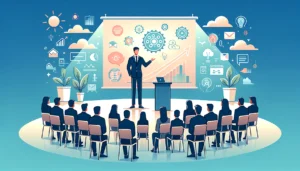Keeping pace with the evolution of HR
- 5 Min Read
HR leaders must develop interpersonal skills, agility, and embrace AI to stay relevant in the evolving workplace.
- Author: Dr Aaron Taylor
- Date published: Apr 16, 2024
- Categories

As the landscape of work continues to evolve, HR professionals find themselves at the forefront of change. Dr. Aaron Taylor, Head of School for HRM at Arden University, delves into the shifting workplace dynamics, including the increasing integration of AI, and offers insights on how HR leaders can future-proof their skills to stay ahead of the curve.
The upheavals brought by the pandemic forced HR teams into survival mode. Beyond facilitating remote work setups, they had to navigate a complex environment of mental and physical health support, all while adhering to evolving health protocols. For struggling companies, HR found itself in control of C-level strategies, managing redundancies, restructures and overall employee wellbeing and retention.
This shift underscores the profound evolution of the HR professional’s role in recent years, elevating their standing both amongst employees and C-suite executives. Central to this shift is the heightened emphasis on the ‘human’ aspect of human resources, particularly in enhancing the employee experience. Broad compliance with legal requisites no longer suffices; understanding employee motivations and aligning them with organisational strategies has become imperative.
In light of these changes, how can HR professionals stay agile and responsive, especially with the ascendance of AI, encouragement of diversity and inclusion and spotlight on employee wellbeing?
Guide to future-proofing your role in HR
- Develop interpersonal skills
HR professionals are increasingly recognising the value of interpersonal skills in complementing automated processes as technology advances. While AI can assist in streamlining tasks and easing administrative burdens, it ultimately lacks the human touch essential to having meaningful connections and understanding human experiences.
In this evolving landscape, HR professionals must not only embrace technological advancements but also prioritise the culture of interpersonal skills to create the perfect balance. This enables HR practitioners to bridge the gap between technology and human interaction, adopting empathy, building trust and nurturing positive relationships within the workplace. As such, anticipating and developing these experiences is vital for navigating the evolving role of HR in the digital age.
Interpersonal skills can also help to boost:
- Communication skills: enabling HR to communicate insights more effectively to leadership teams and influence strategic decisions.
- Business insight: building a general awareness with a deeper understanding of business dynamics enables HR professionals to better align people strategies with overarching organisational goals.
As HR assumes a more prominent role, possessing robust interpersonal skills becomes instrumental in driving people-centric decision-making processes.
2. Foster agility, collaboration and creativity
Given the unpredictable nature of technological advancements and market dynamics, agility, collaboration and creativity emerge as indispensable traits for HR professionals:
- Adaptability: embracing agility helps HR professionals to swiftly respond to emerging challenges and capitalise on new opportunities.
- Collaboration: collaborating with other departments ensures policies and changes are in sync with broader organisational objectives, while also bringing diverse perspectives and expertise. This helps to develop comprehensive solutions.
- Creativity in problem-solving: harnessing creative problem-solving techniques can help HR to navigate unforeseen disruptions, such as the COVID-19 pandemic.
Despite inherent challenges, working in HR offers opportunities for meaningful impact. Amongst the uncertainties of the future, the pursuit of creating better workplaces and fostering employee engagement remains the primary focus of HR professionals. A culture of collaboration encourages creativity within HR teams, leading to the development of innovative solutions to address evolving workforce needs.
3. Embrace AI Integration
Research indicates that 66% of CEOs recognise the potential of AI to drive value in HR. Academic findings further highlight the synergy between HR practices and AI applications in enhancing company performance by analysing, predicting and diagnosing operational holdups.
From a HR perspective, AI can:
- Support talent acquisition: by attracting and assessing talent by searching for candidates across a wide range of sources, including job boards and social media. It can also help to identify the root causes of high employee turnover.
- Address diversity gaps: by identifying areas lacking in diverse talent pools, paving the way for targeted recruitment strategies.
AI has the potential to enhance diversity and inclusion efforts in the workplace by providing data-driven insights, mitigating biases and promoting fairer decision-making processes. However, it’s crucial to ensure that AI systems are designed and implemented thoughtfully to avoid reinforcing existing inequalities or introducing new biases into the workplace. Ongoing monitoring, evaluation and refinement are essential to harnessing the full potential of AI in raising diversity and inclusion.
While cutting-edge AI solutions may currently be out of reach for many businesses, leveraging AI for automated tasks can streamline HR operations and enhance its value proposition within organisations.
As HR continues to evolve, staying on top of emerging trends and honing a diverse skill set will be pivotal in ensuring relevance and effectiveness in navigating the dynamic landscape of the workplace. By embracing change and fostering a culture of continuous learning, HR professionals can indeed future-proof their roles and make significant contributions to organisational success in the years to come.









